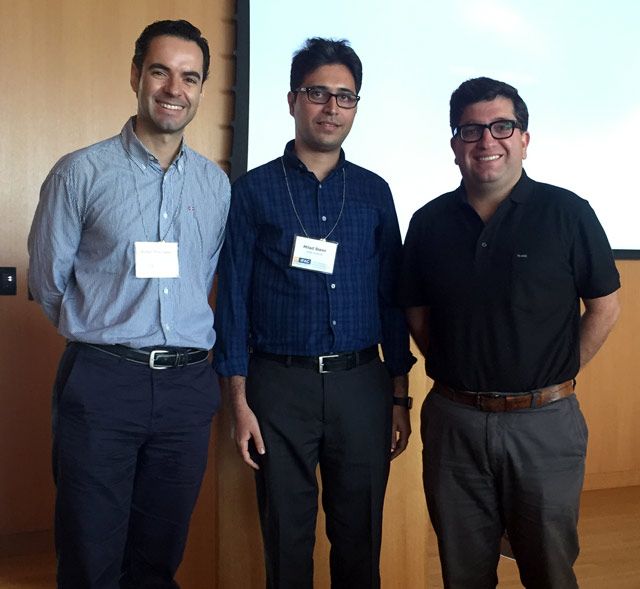Ph.D. candidate Milad Siami wins award for research in networked control systems
As even its most ardent supporters would admit, the phrase "Networked and Distributed Control Systems" may not be a headline grabber -- yet much of the coming wave of technological advancement absolutely relies upon it.
This academic field holds serious implications for the control and efficiency of large multi-agent systems whose elements interact with one other to accomplish a task. Complex, dynamical networks such as these are found in our cells and in our financial markets. Think fleets of autonomous vehicles, advanced electricity networks, and even our understanding of physiological systems and gene networks.
As society moves ever closer to widespread adoption of smart cities and grids, connected health, and mobile-everything-everywhere, the networks that support it all will need to make blazingly fast and ultra-reliable decisions and transmissions while operating with incredible efficiency.
In a large-scale complex network, regardless of what that network actually does, the way in which the various points on the network exchange information has enormous implications to the network’s reliability and utility. Lehigh University’s Distributed Control and Dynamical Systems (DCDS) Laboratory develops theoretical foundations for understanding how this phenomenon helps, or hinders, real-world applications.
Milad Siami, a Ph.D. student in the DCDS Lab, recently won the Best Student Paper Award at the 5th International Federation of Automatic Control (IFAC) Workshop on Distributed Estimation and Control in Networked Systems. The paper, Network Sparsification with Guaranteed Systemic Performance Measures, examined efficient techniques for management of large networks in terms of performance.
Working with his advisor Nader Motee, assistant professor of mechanical engineering and mechanics, Milad explores processes in multi-agent systems by which a collection of interacting agents achieve a common goal or opinion.
In the award-winning paper, Siami and Motee developed a framework to produce a sparse approximation of a given large-scale dynamical network using a nearly linear time algorithm. To begin, they had to prove that a sparse approximation existed for a given network. Once proven, they presented an efficient and fast algorithm for finding a near-optimal sparse approximation of the given network. The results of this research can be used when real-world large-scale dynamical networks need to be simulated, controlled or redesigned using efficient computational tools that are specifically tailored for optimization problems with sparse structures.
"Our research is concerned with the synthesis of sparse consensus networks -- networks whose number of communication links is proportional to the number of its agents," says Motee. "This architecture is more amenable to efficient optimization, and maintaining them is usually more cost effective due to reduced communication requirements. Therefore, approximating a given dense consensus network by a suitable sparse network is an important analysis and synthesis problem."
The existing state-of-the-art standard for network sparsification in the context of networked systems before Siami and Motee's paper was unable to provide performance bounds for the resulting sparsified network. Siami’s work is the first to quantify the relative performance loss of the sparsified network with respect to a general class of systemic performance measures. Moreover, the complexity of the proposed randomized sparsification algorithm is nearly linear in time, which makes this method ideal for analysis and synthesis of consensus networks comprised of millions of agents.
Through their sparsification methods, Siami and Motee created a new method of finding the sparse consensus network. One of the many important applications of this method will be in the way that unmanned aerial vehicles (UAVs) function. By using this method, there will be fewer connections that could be breached, thus making the network both more secure and efficient.
The papers at the IFAC Workshop were judged on originality, clarity, and potential impact on practical applications or theoretical foundations of estimation and control in networked systems. This year's competition included teams represented several well-known universities from around the globe.
"Throughout the process of writing and submitting this paper, both of us were very enthusiastic and excited about the results we presented," Motee recalls.
"I was truly gratified to be recognized for effort put into the research and specifically that paper," says Siami. "My research has a wide variety of applications in different disciplines and research areas, and I hope it will be used to support the design of important future systems."
-Talia Dunyak '16 is a student-writer with the P.C. Rossin College of Engineering and Applied Science.

